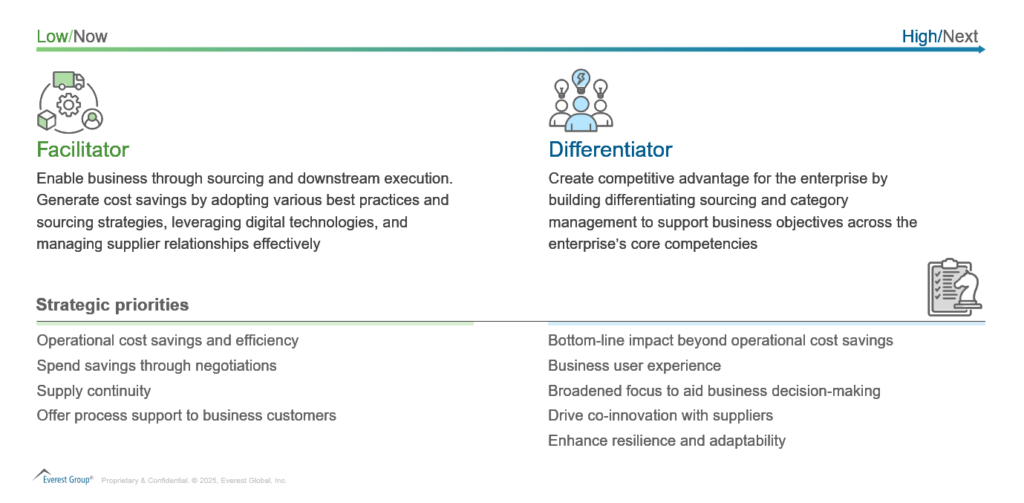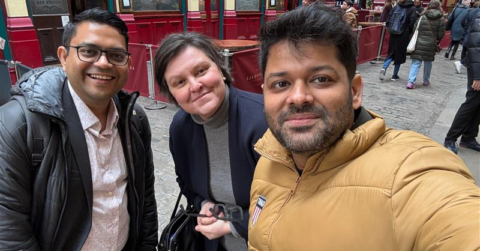
The answer to this question isn’t straightforward—hence, this blog.
Whenever technology breaks barriers, a common concern arises: Will technology replace humans in doing XY and Z job? More often than not, the answer isn’t a simple “Yes” or “No.” It’s usually “Yes, but…” or “No, but…”—and that “but” is crucial, as it determines how we should adapt. Everything else is secondary.
So, let’s explore this famous “but” in answering the question: Will artificial intelligence (AI) make procurement obsolete in the future?
Reach out to discuss this topic in depth.
AI’s expanding role in procurement –
AI, including generative AI (gen AI) and agentic AI, is transforming business processes across functions —procurement included. The combined power of these technologies enables creativity, autonomy, and decision-making in procurement, pushing automation beyond transactional activities.
For years, end-to-end automation has been a stated objective, yet in practice, automation has largely been limited to tactical and transactional tasks—such as purchase order creation, invoice processing, and basic spend analytics.
Strategic and judgment-intensive activities like supplier negotiations, risk assessment, contract optimization, and category planning have remained human-led, with technology serving as an enabler rather than an operator.
However, this is changing. With generative and agentic AI advancing rapidly, we are moving toward a world where AI can take the lead in procurement operations, with humans acting as supervisors approving actions. Further advancements in technology are only natural and expected which prompts our thinking – what’s next?
The path to fully autonomous procurement –
AI agents are increasingly capable of achieving objectives with minimal human intervention. It’s not unreasonable to envision a future where AI can autonomously:
- Optimize procurement processes
- Identify and select suppliers
- Negotiate and contract with suppliers
- Manage suppliers
- Mitigate risk and ensure compliance
- Track and assess performance
- Drive cost efficiencies
In this scenario, AI doesn’t just assist—it operates. Procurement, as we define it today, will likely be owned and executed by AI agents, reducing the need for full-time human roles in operational procurement.
This would solve for a common issue that we hear from procurement leaders – how it is increasingly difficult to find the right talent. In essence, we will see fewer FTEs (full-time employees) managing procurement operations and more FTAs (full-time AI agents) running them—with the right expertise, but without fatigue, motivation dips, or human error.
What remains for FTEs is to focus on more challenging and interesting work such as developing and maintaining the FTAs. Humans will retain oversight for approvals and ethical considerations, while AI will undeniably dominate in operational procurement, thereby leading to procurement reinventing itself.
The new purpose of procurement –
Organizations today expect procurement to be more than just a cost-cutting function. It is evolving into a strategic enabler and business differentiator, influencing areas beyond procurement’s traditional scope.

Currently, many mature procurement organizations only partially achieve these goals. Supplier management still focuses primarily on performance within the existing contract scope rather than long-term innovation. Risk management remains reactive rather than proactive and predictive. Resilience and adaptability are often afterthoughts, rather than embedded in procurement strategy.
As businesses reinvent their operating models, procurement must lead the change—not just support it. Increasing reliance on cross-industry partnerships, sustainability commitments, and evolving regulatory frameworks means procurement will play a key role in enabling enterprise-wide transformation. AI is critical in enabling procurement to drive and accomplish these objectives, but it cannot do so independently.
What AI cannot replace –
AI excels at pattern recognition, data analysis, and automation—but it lacks key human capabilities essential for procurement’s future role:
- Emotional intelligence and trust-building – AI can analyze supplier performance and risk factors, but it can’t build trust, negotiate beyond logic, or foster collaboration that drives innovation
- Abstract and divergent thinking – AI can optimize decisions based on existing data but struggles with unconventional problem-solving and out-of-the-box thinking
- Strategic vision and business alignment – AI can process vast amounts of information but can’t inherently align procurement strategies with evolving business goals beyond what it has been trained on
For example, AI may identify the best-suited supplier based on cost, risk, and market trends—but it cannot cultivate a relationship with that supplier to unlock deeper collaboration, co-innovation, or strategic synergies.
Thus, while AI will operate procurement, it cannot redefine procurement’s strategic vision. That responsibility will remain with humans.
The Future of Procurement –
So, will AI make procurement obsolete?
Yes, procurement in its current, transactional form will become obsolete. But procurement’s strategic role will only become more vital.
Procurement will shift from being a facilitator to a differentiator, focusing on business strategy, innovation, and relationship management rather than merely executing sourcing events.
The future of procurement isn’t about choosing AI or humans—it’s about how procurement leaders leverage AI to elevate procurement’s impact on business objectives.
AI will redefine procurement operations while humans will redefine its purpose. If you found this blog interesting, check out our The Rise Of Cloud Marketplaces As A Procurement Channel For Software, SAAS, And Services Solutions | Blog – Everest Group, which delves deeper into another topic regarding procurement.
If you are in an organization planning or undergoing procurement transformation or a service provider or technology provider enabling procurement services and would like to know more about what’s next in procurement, feel free to contact Amy Fong ([email protected]), Shirley Hung ([email protected]), Prateek Singh ([email protected]), or Akash Thunga ([email protected]).










